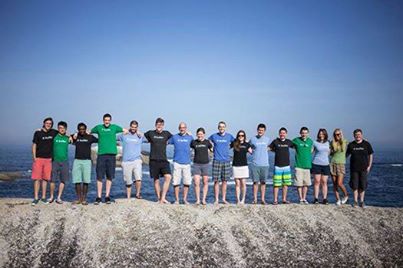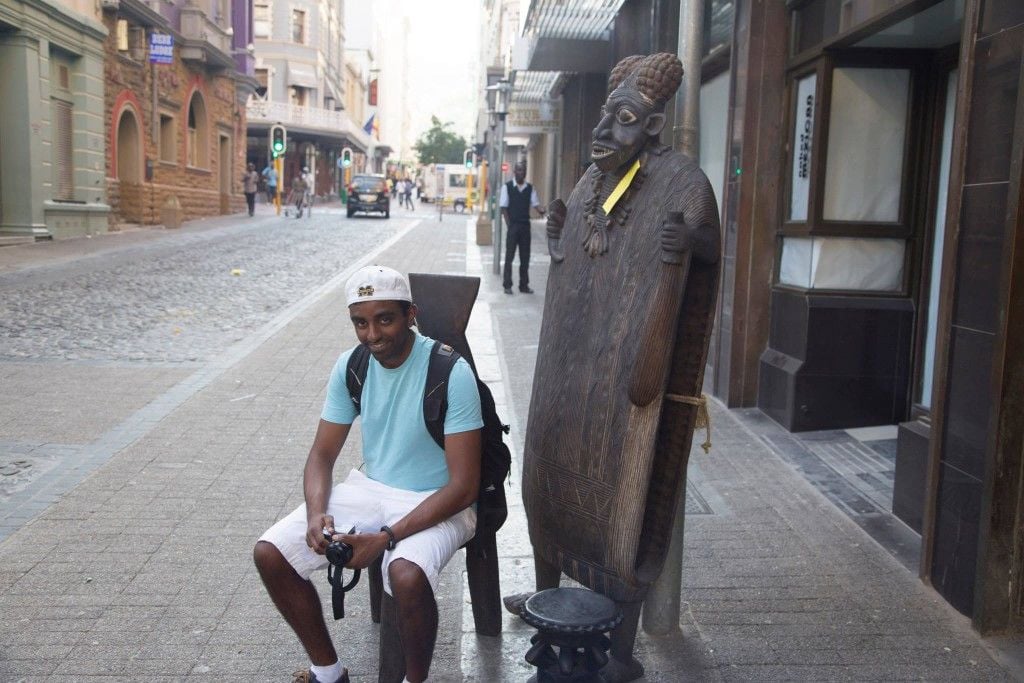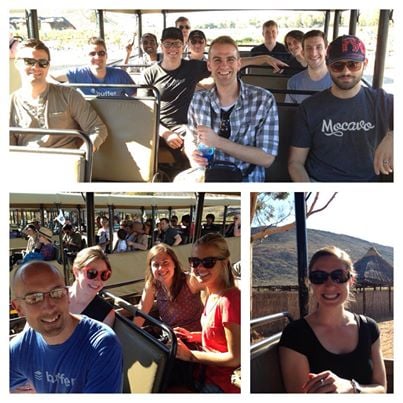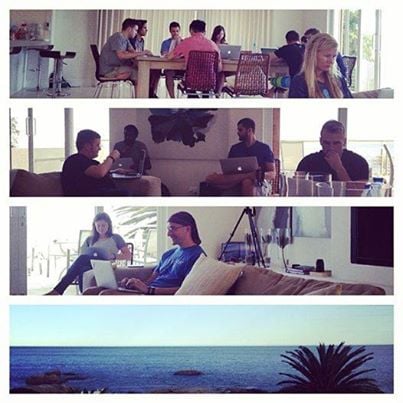
For me, one of the most exciting parts of the culture we’ve developed at Buffer is our international retreats.
Three times a year (for now) we gather the whole company together. Previously, we took a team of 10 to Thailand and we’ve just returned from our most recent trip to Cape Town, South Africa with a team of 16. Buffer covers all the expenses—flights, accommodation, most meals and fun activities.
Here are some of my biggest learnings on the benefits of our time together on these retreats.
Truly getting to know each other
There are an incredible number of benefits which come from us being a distributed team. At the same time, it means that if we don’t arrange retreats, we would never meet each other.
It still blows my mind that we can have someone join the team and work together (very effectively) for several months without meeting in person. With chatting all day via HipChat and video calling frequently using Sqwiggle, we even get to know each other very well.
However, there’s something magical that happens when you meet in person. In a retreat setting it’s even more powerful. We have casual meals together and do activities on off days. We can learn about what makes each other tick and what our true passions are.

It’s also an opportunity to reinforce the 10 Buffer values that are so important to us as a team and to share the story of our journey so far. In Cape Town, we had team get-together to discuss Buffer’s past as well as future. Here’s Leo and me telling the story of Buffer:

Once you return home (Buffer team members are spread all across the globe), the conversations you have with team members are enhanced. You know the tone of somebody’s voice and the way they approach problems and discussions. You read their emails differently. This changes things, and is why we’ve found retreats to be not only a fun part of our culture, but an absolute necessity.
Live and work smarter, not harder
As a company, one of our values is to “live smarter, not harder.” This means to think about what affects how well we work and try to optimize to be more productive. It means that almost always, working more is not the answer. We’ve had a number of occasions where we’ve been at full capacity and feeling overwhelmed, and after a brainstorm figured out how to do more without spending more time or working through lunch.
In our “live smarter, not harder” value in the culture deck, we have the following point:
You choose to be at the single place on Earth where you are the happiest and most productive, and you are not afraid to find out where that is.
It’s our belief that environment can fundamentally affect how happy and productive we are. As an example, I think the people you surround yourself with can change who you are and what you achieve.
We do retreats so that everyone has the chance to experience new cultures and grow more open minded.

Often team members will travel for some weeks around the retreat or stay in the location beyond the 10 days we spend together. I think this is great for people and helps Buffer as a whole.
Choosing not to live a deferred life
“And then there is the most dangerous risk of all — the risk of spending your life not doing what you want on the bet you can buy yourself the freedom to do it later.” – Randy Komisar
One of my favorite things about doing retreats is that we’re choosing to travel and have these experiences right now.

The concept of the deferred life plan is something I discovered from Randy Komisar, and it really resonates with me. Often travel or moving can be something that you delay for many years. It’s easy to convince yourself that the only way to travel or explore is to work for 5 years and then take 6 months off between jobs. At Buffer, anyone can travel or move anytime. It’s hardly even noticeable.
This is important because as a startup we want to move fast and make decisions as soon as we see that they are necessary. Whether it’s killing a feature which is not getting much engagement or introducing a new support channel, it can be easy to put these things off. Especially big changes like adjusting our pricing or making salaries completely transparent, it’s easy to stay where we are and avoid change.
We try to weave this notion of doing what you love and what you’re passionate about and believe in, right into the culture of the company. Retreats stretch us and remind us that we can do whatever we want, even travel 25 hours across the other side of the world. Once you’re there, you realize it wasn’t that big of a deal, and you can push yourself in so many other ways too.
We get an insane amount done together
When we go on retreat, it’s not a vacation—although it’s as fun as one. We work together for a week and then we enjoy some awesome activities at the weekend—like jet skiing or visiting a tropical island. Here’s a look at the team before we set off on a safari in South Africa:

We’re still figuring out the exact right setup and schedule for retreats—in fact, that was one of our team discussions last week. So far, hacking together has worked very well and become a key part of retreat week. We’re inspired by how Automattic do this and have scaled it:
“From our very first meetup of 8 people all the way through to last week’s at 122 people, we’ve always spent a good portion of the week co-working on projects and launching them at the end of the week.”
Retreats are some of our most productive weeks of the year. At our last retreat in Pattaya, Thailand, we built most of Buffer for Business and launched it just a week later. In Cape Town, we launched Buffer for iOS 7, opened up our equity formula to the public and worked together to protect our customers from the Heartbleed bug, among other projects.

To hear more about how Leo and I think about retreats, you can watch this brief Founder’s Chat video we recently recorded (at the airport on the way to Cape Town!) about the concept:
Want to be part of a Buffer retreat? We’re looking for people to help us provide support and build awesome features for customers. Check out our openings →
Try Buffer for free
190,000+ creators, small businesses, and marketers use Buffer to grow their audiences every month.



